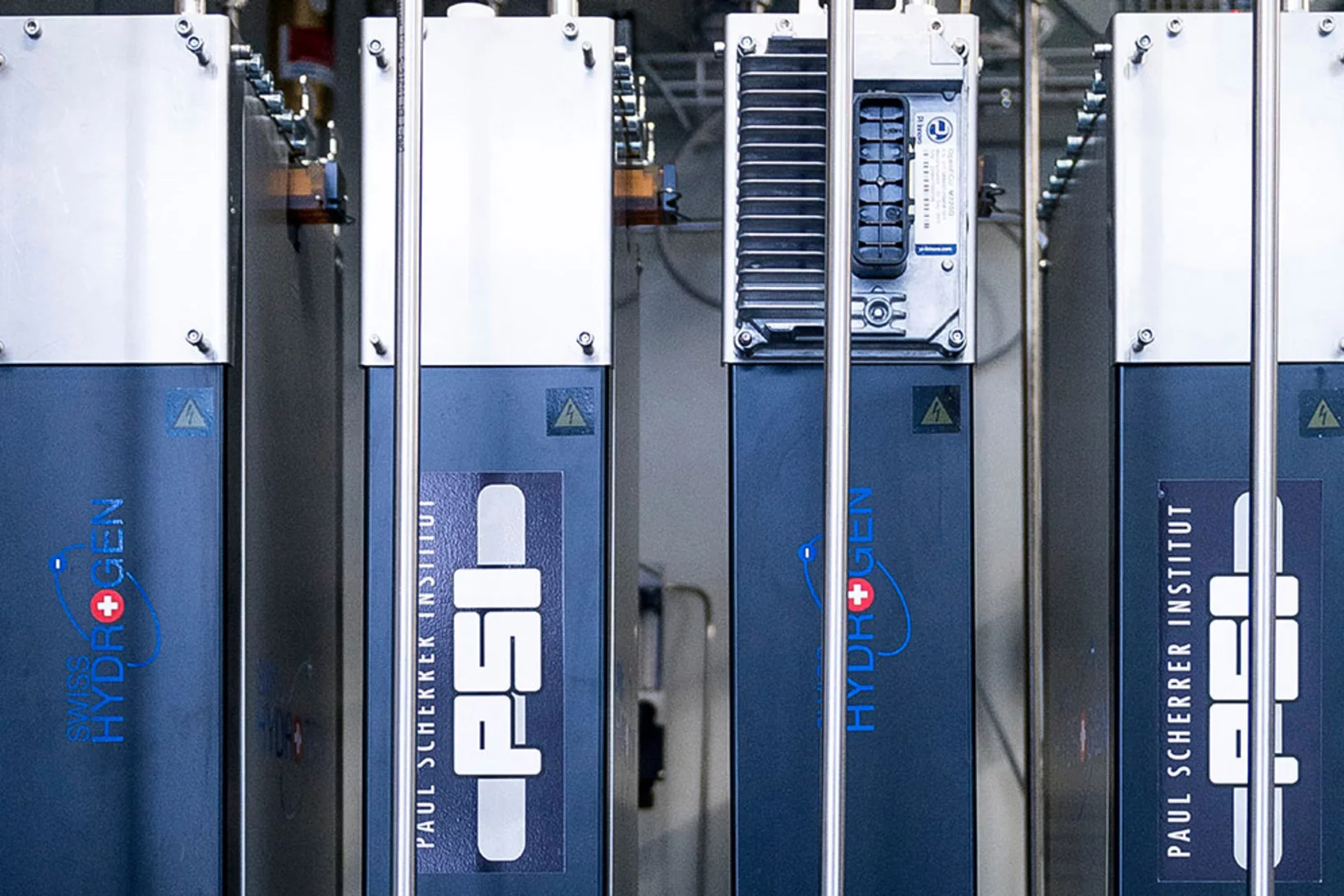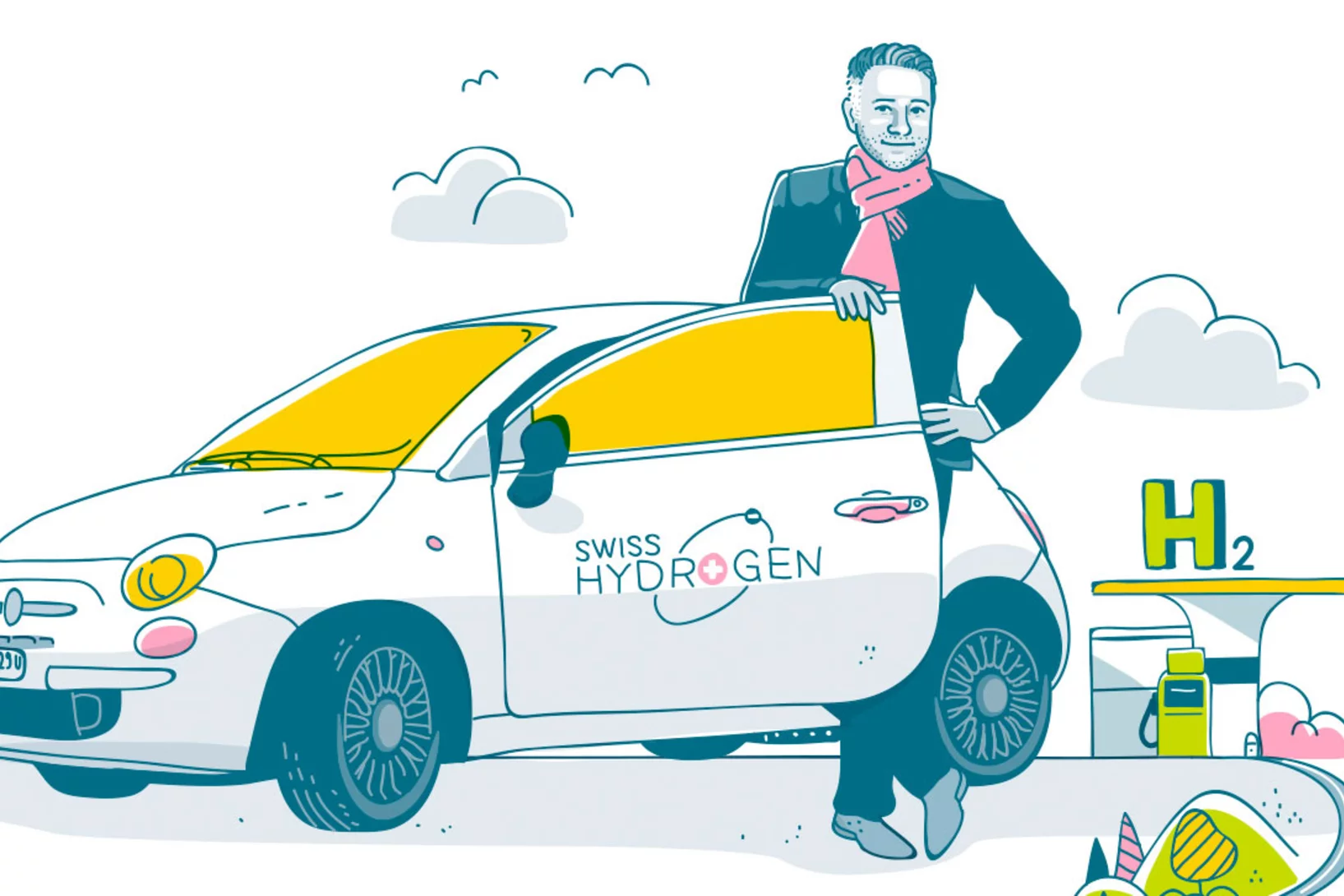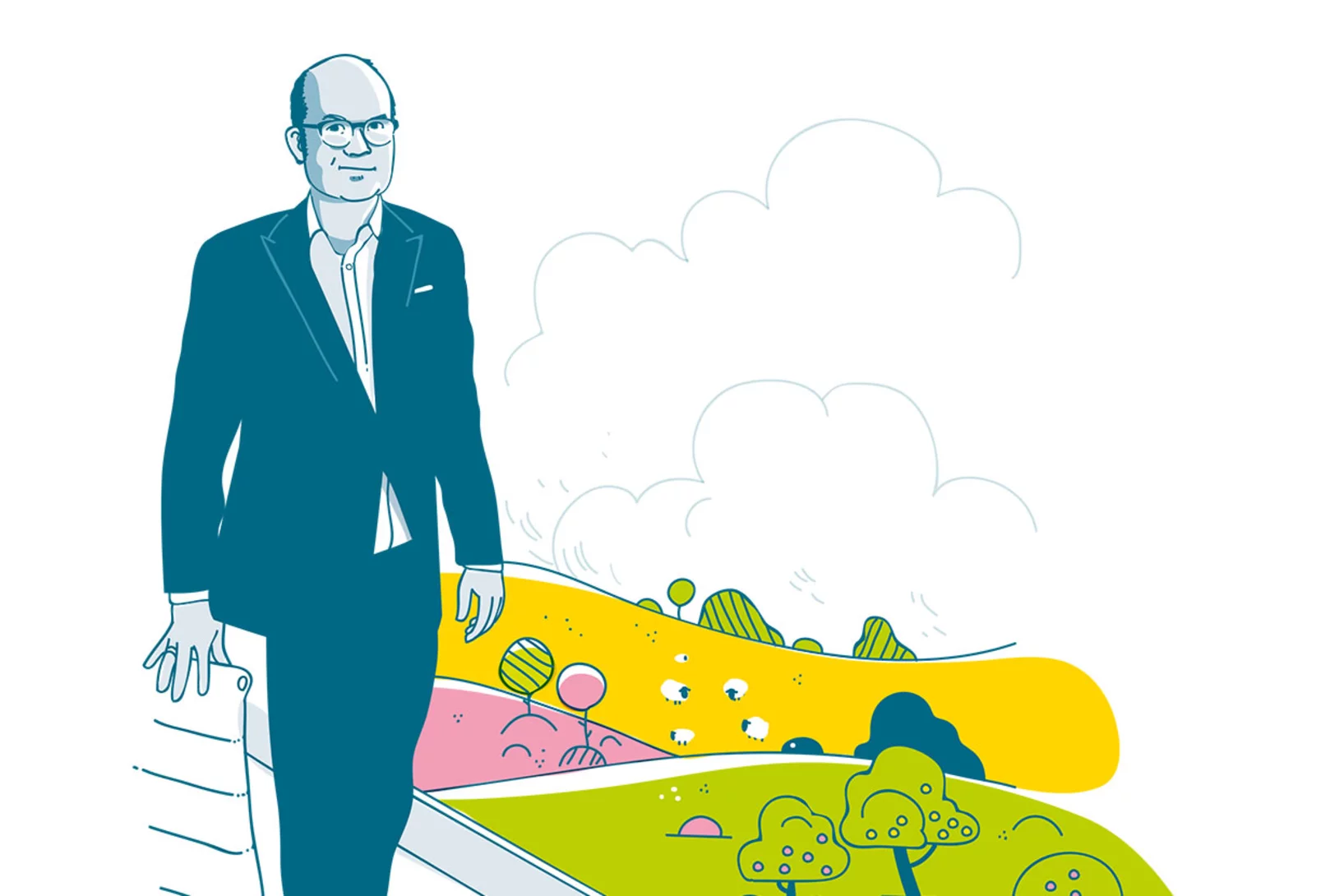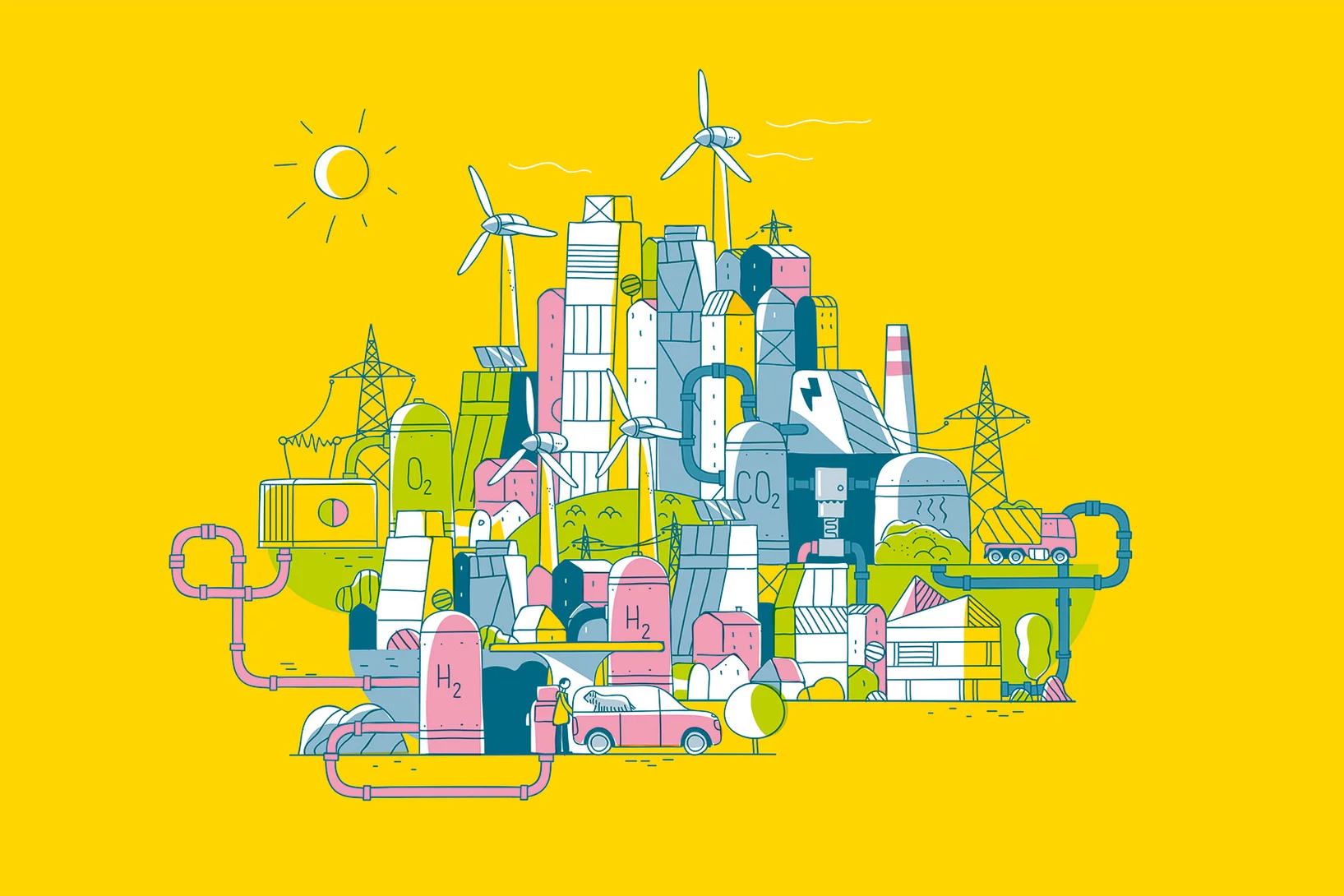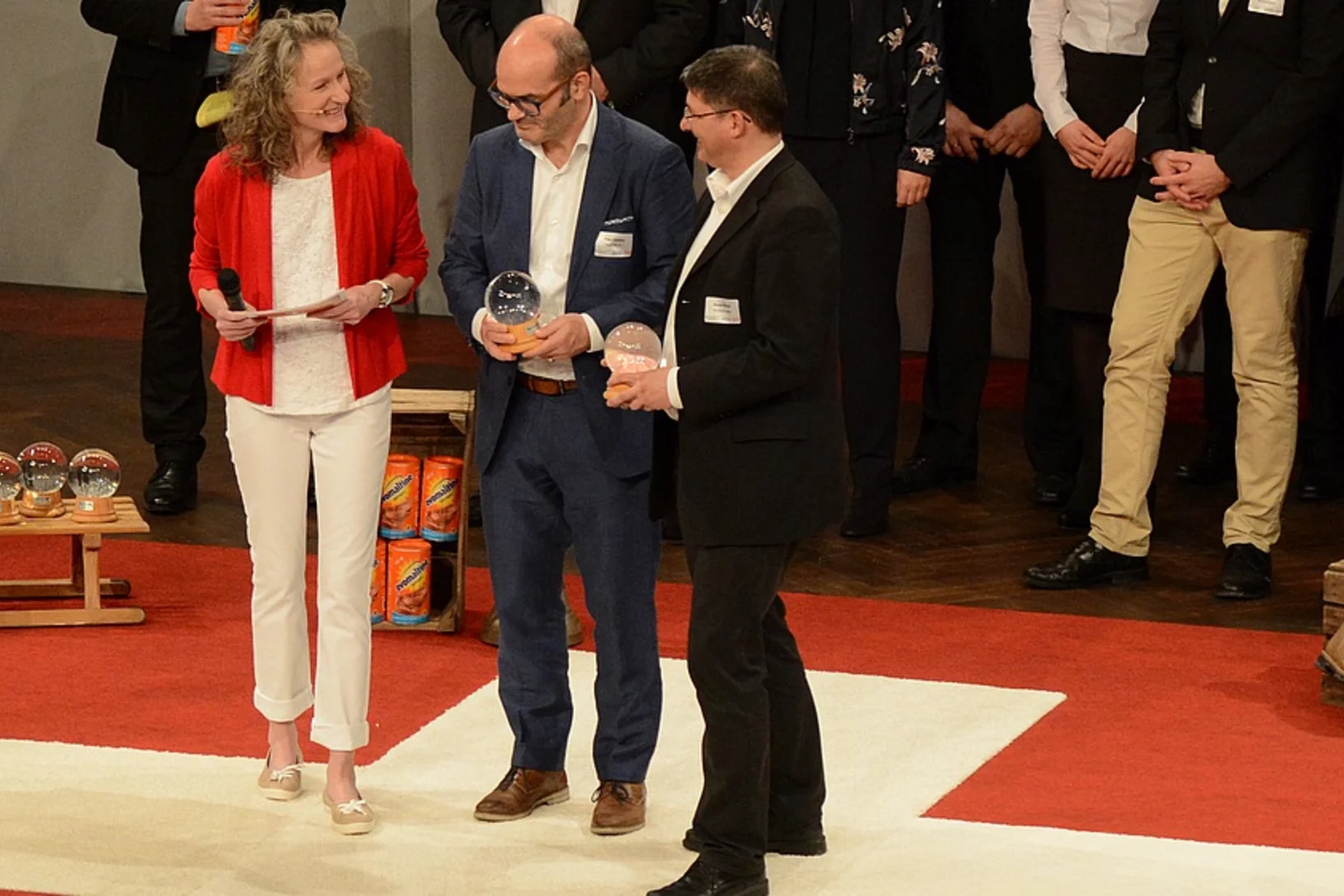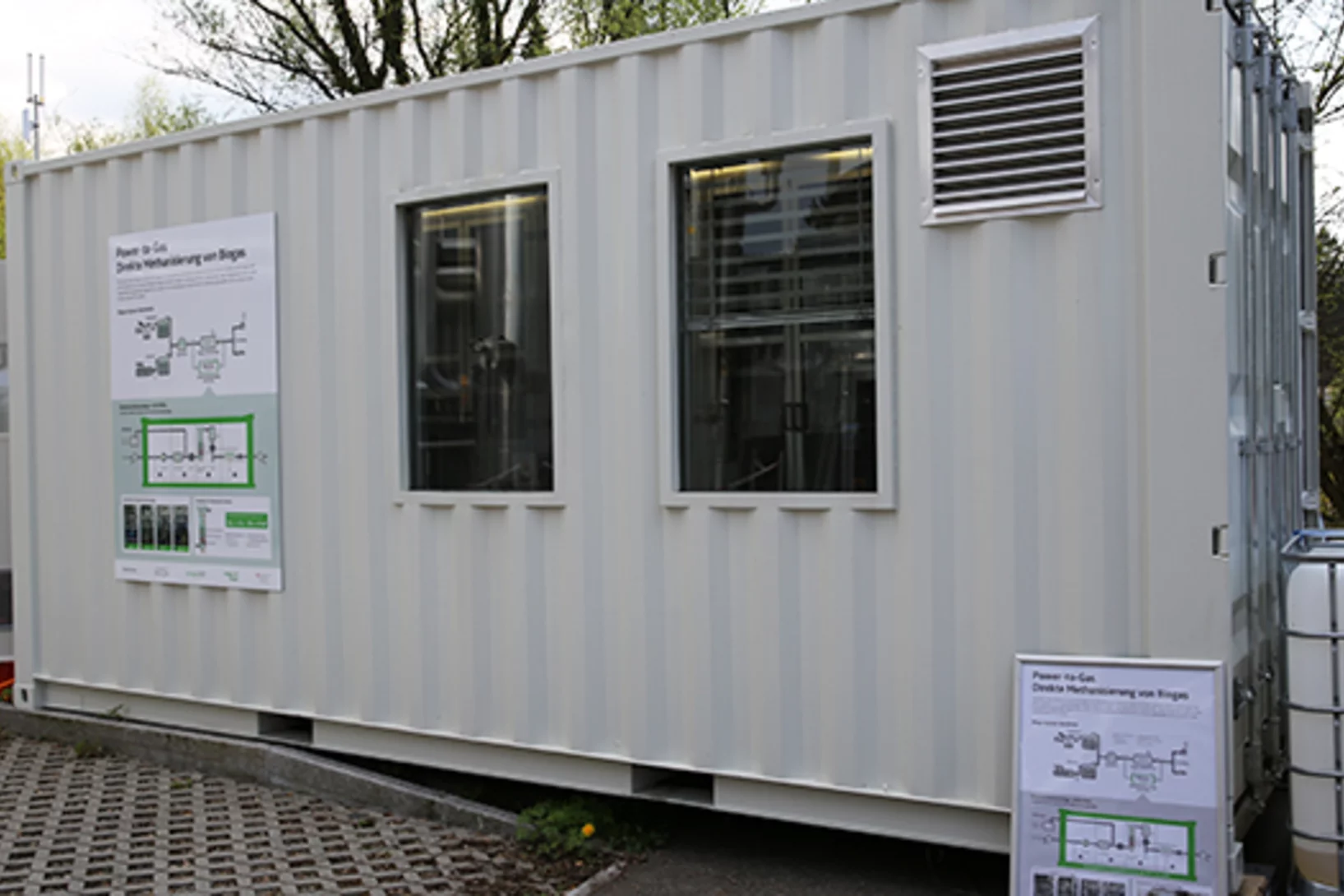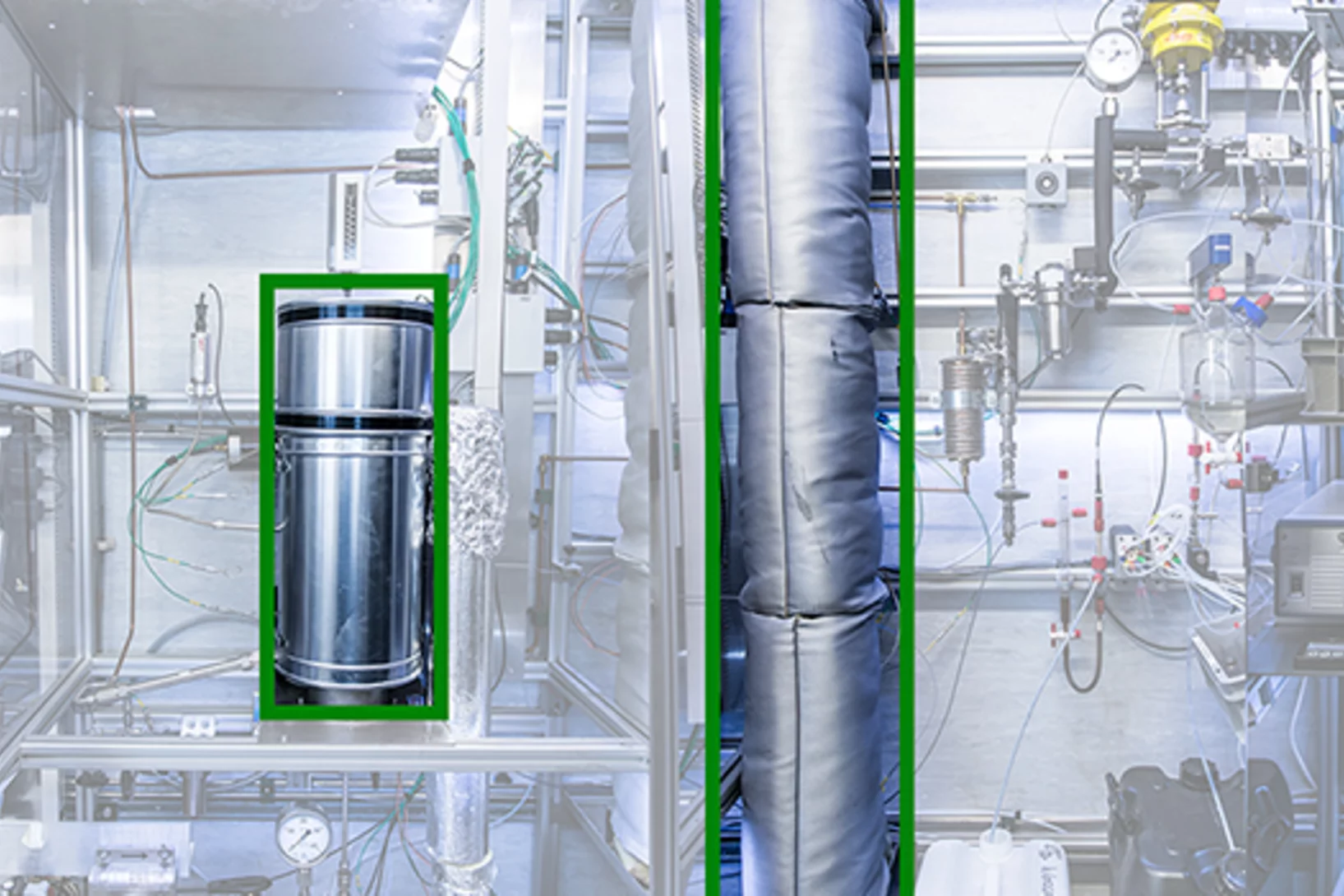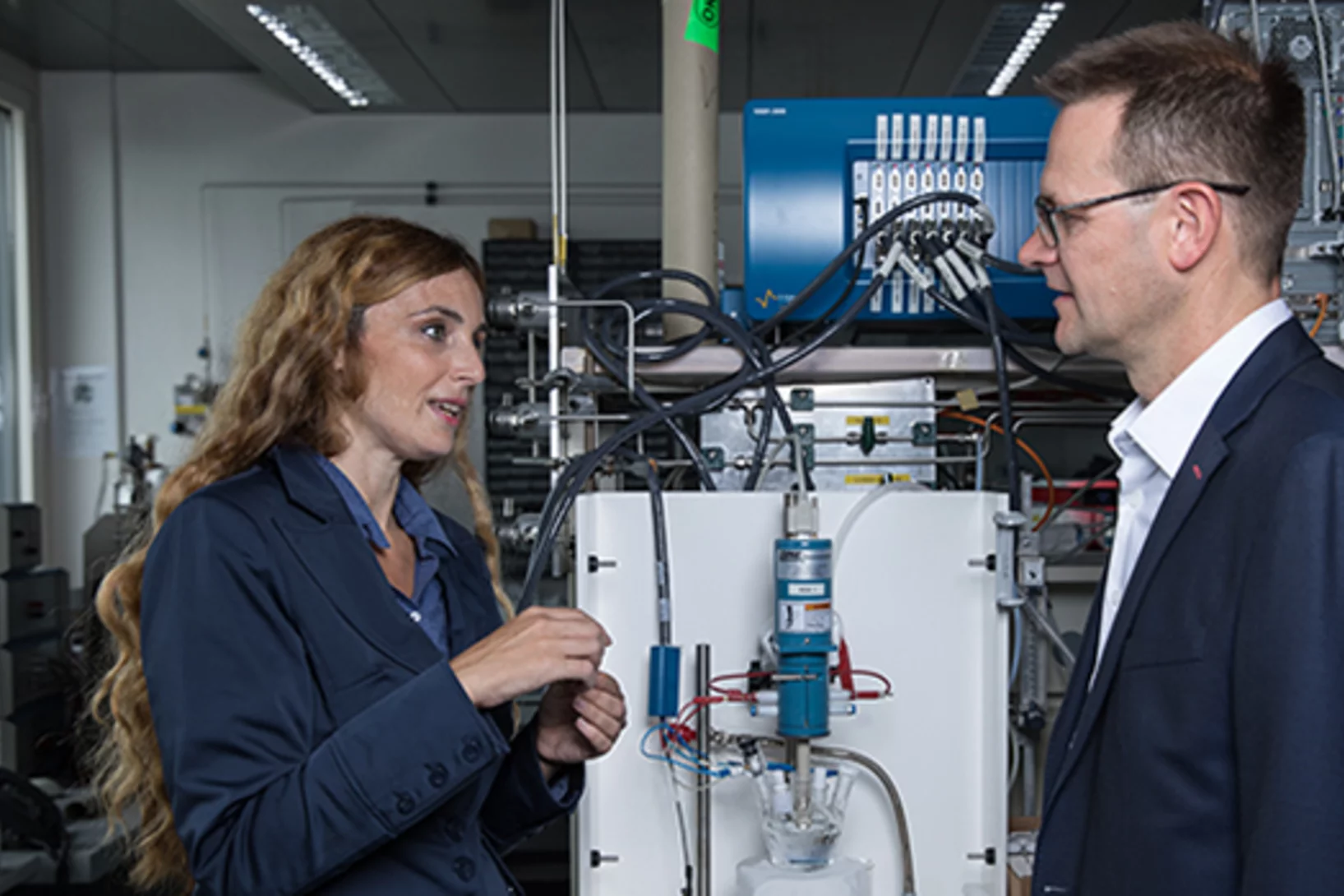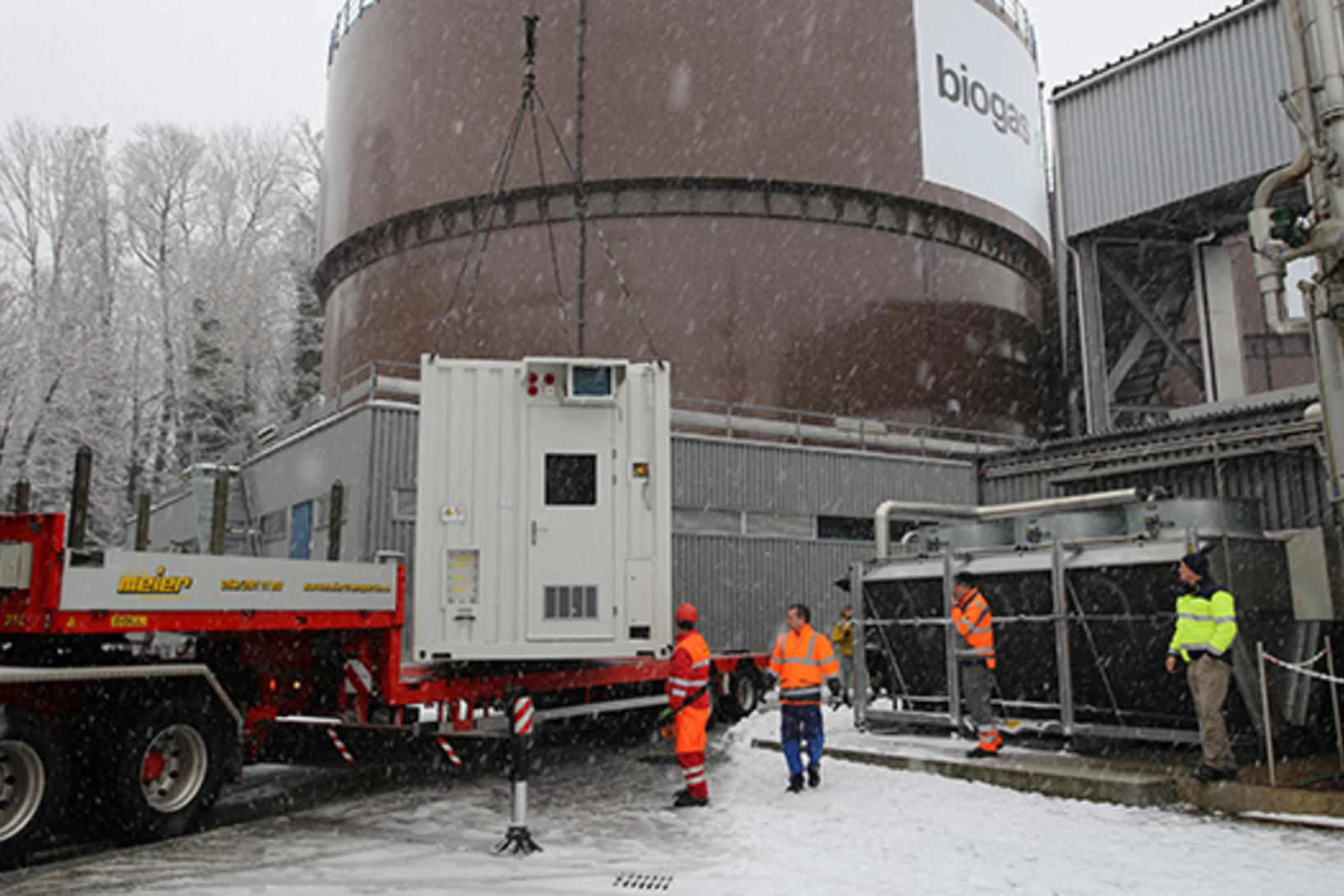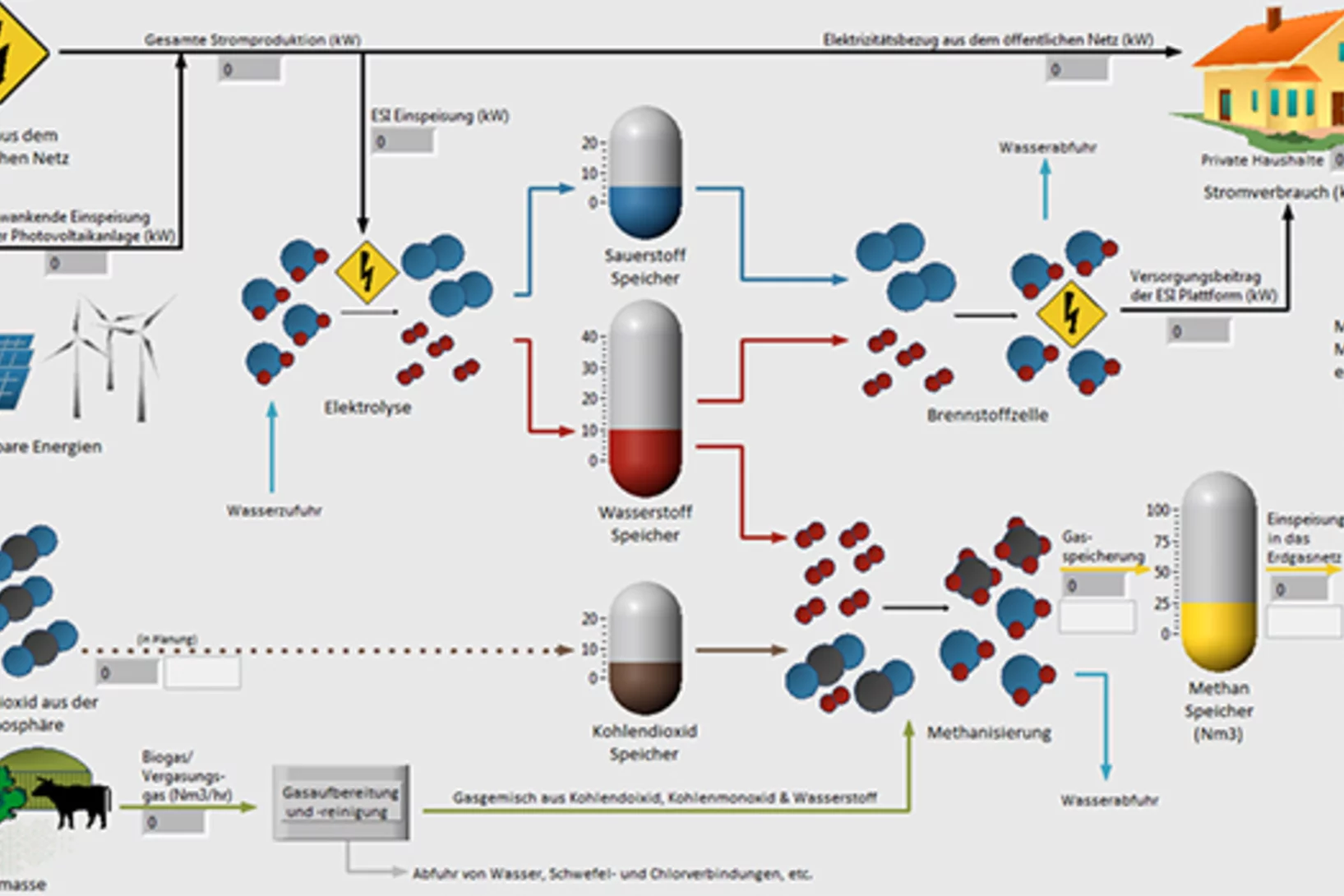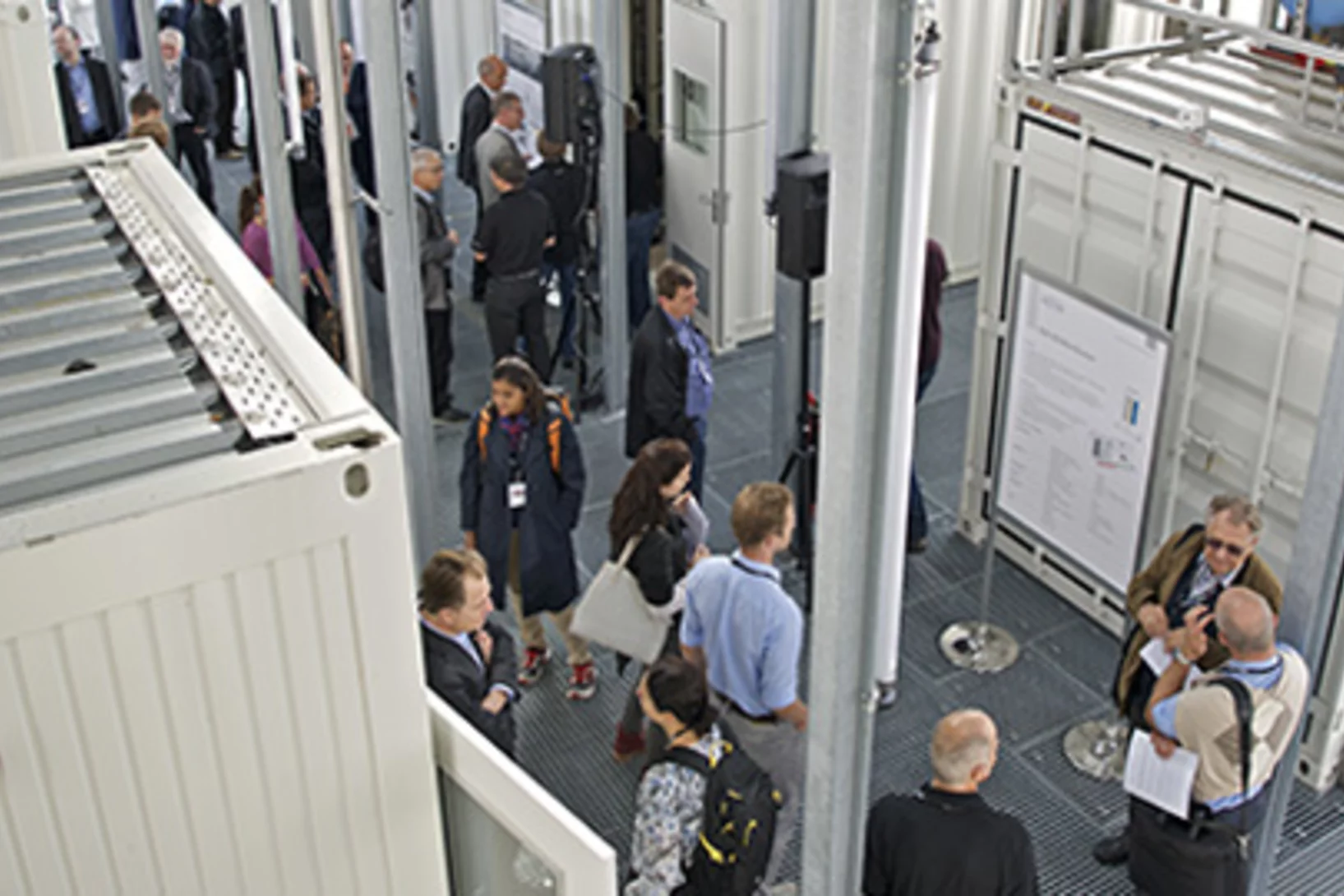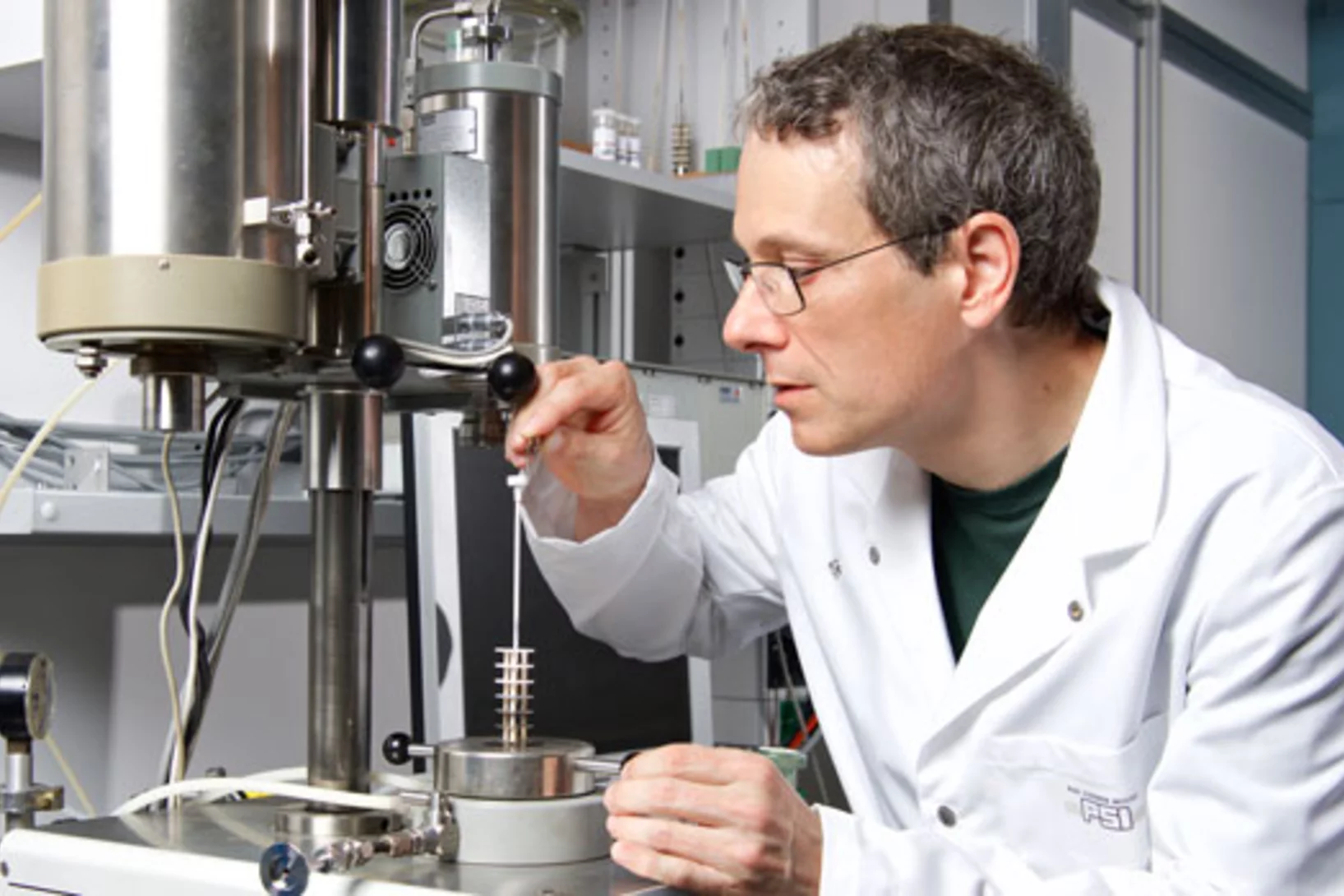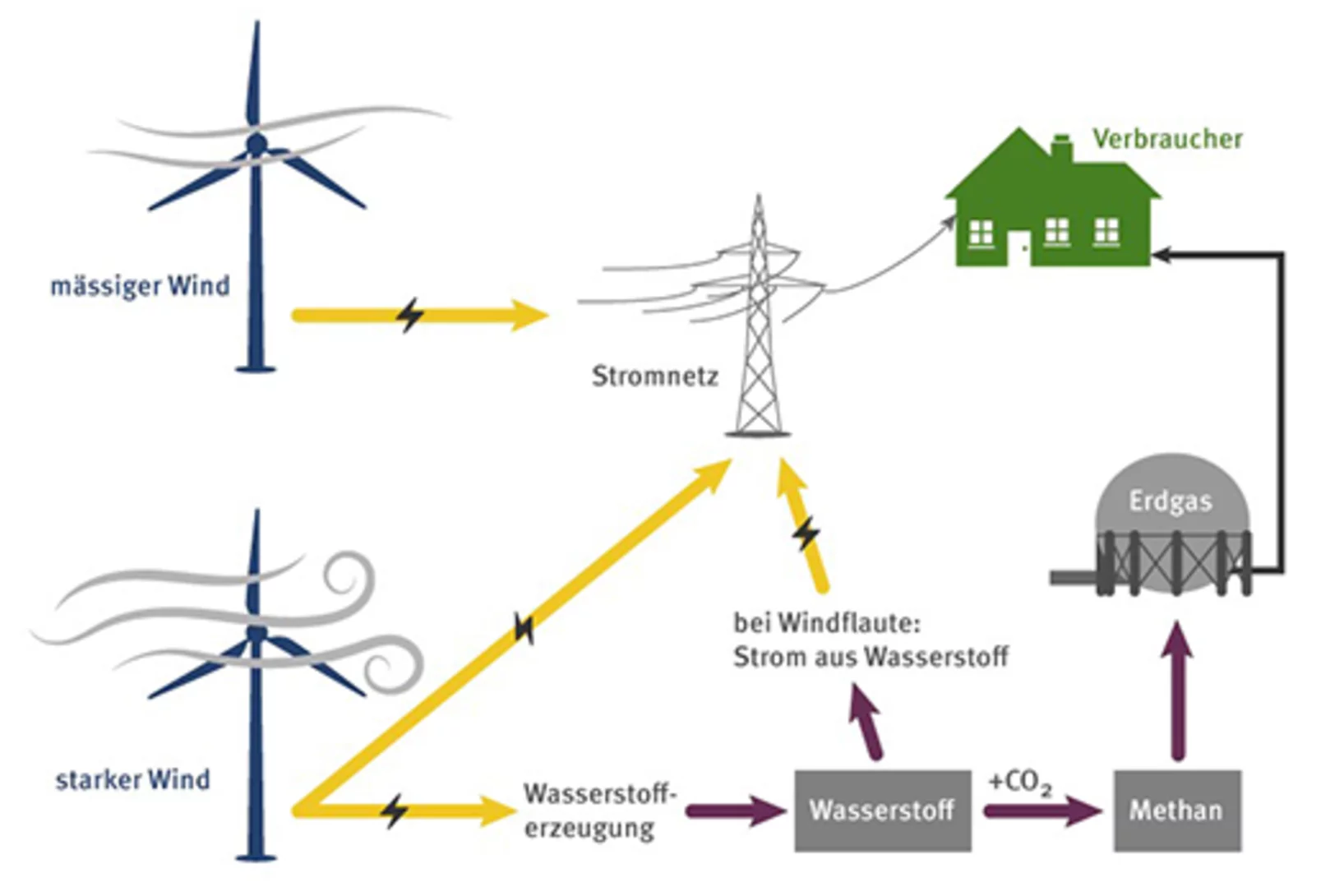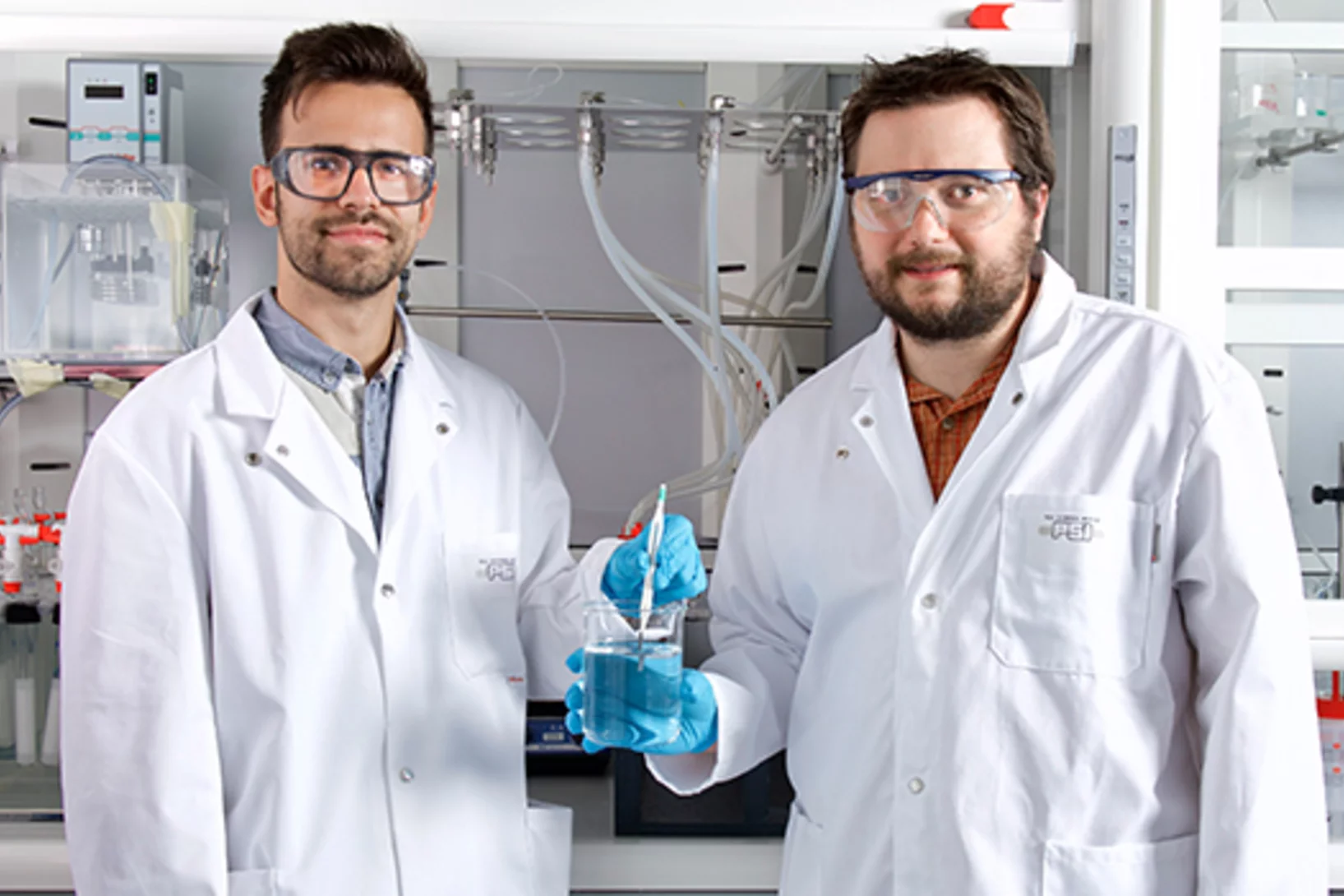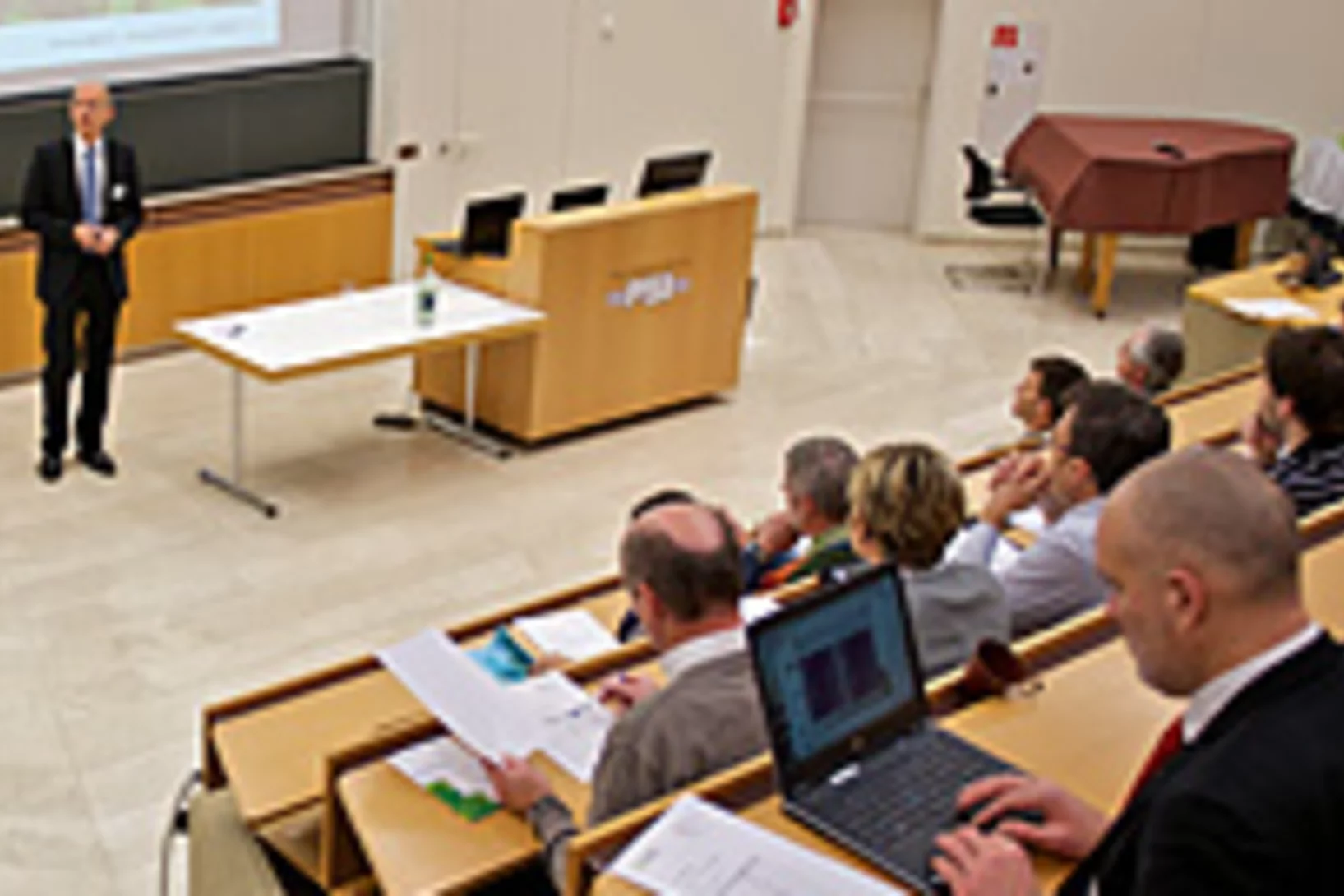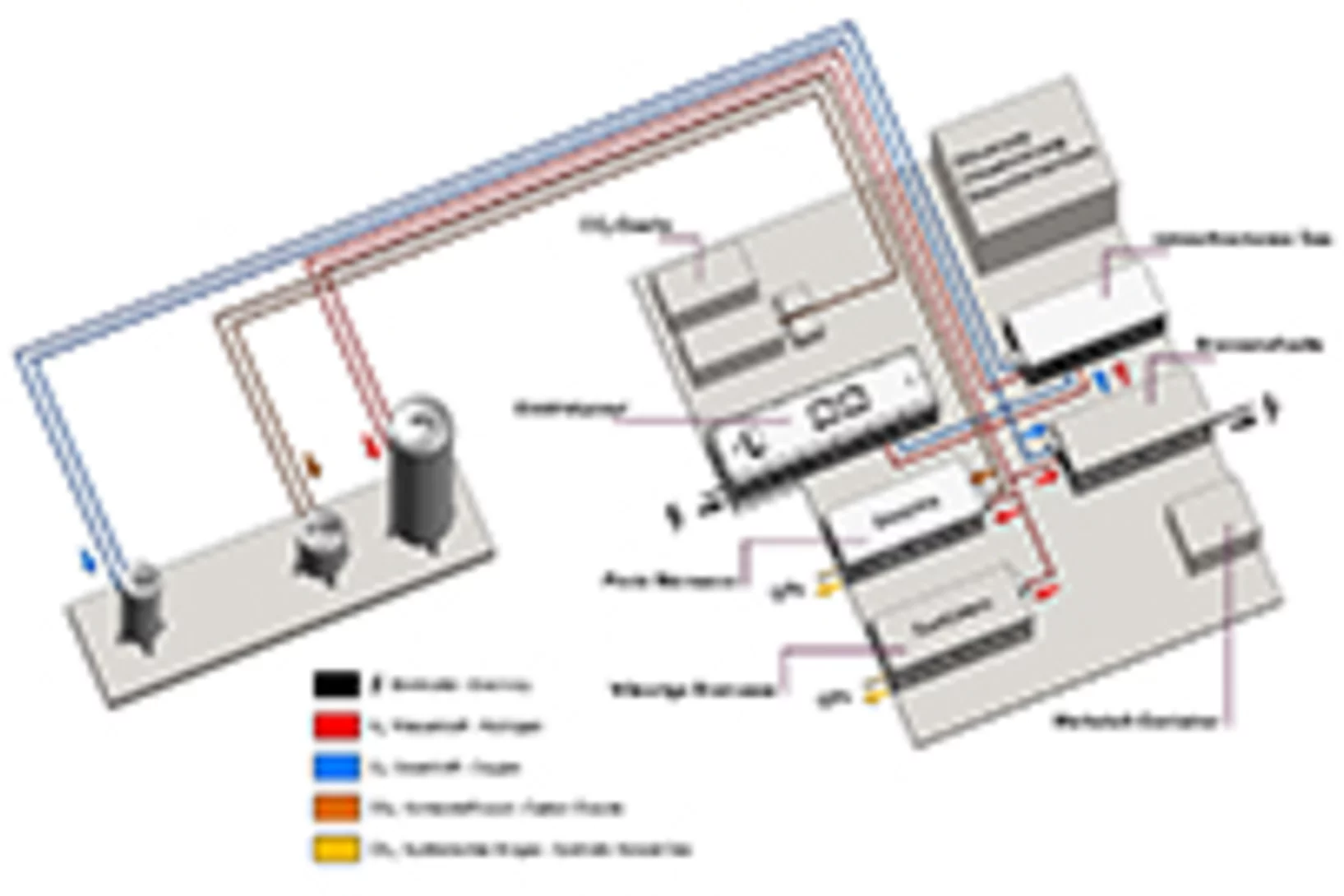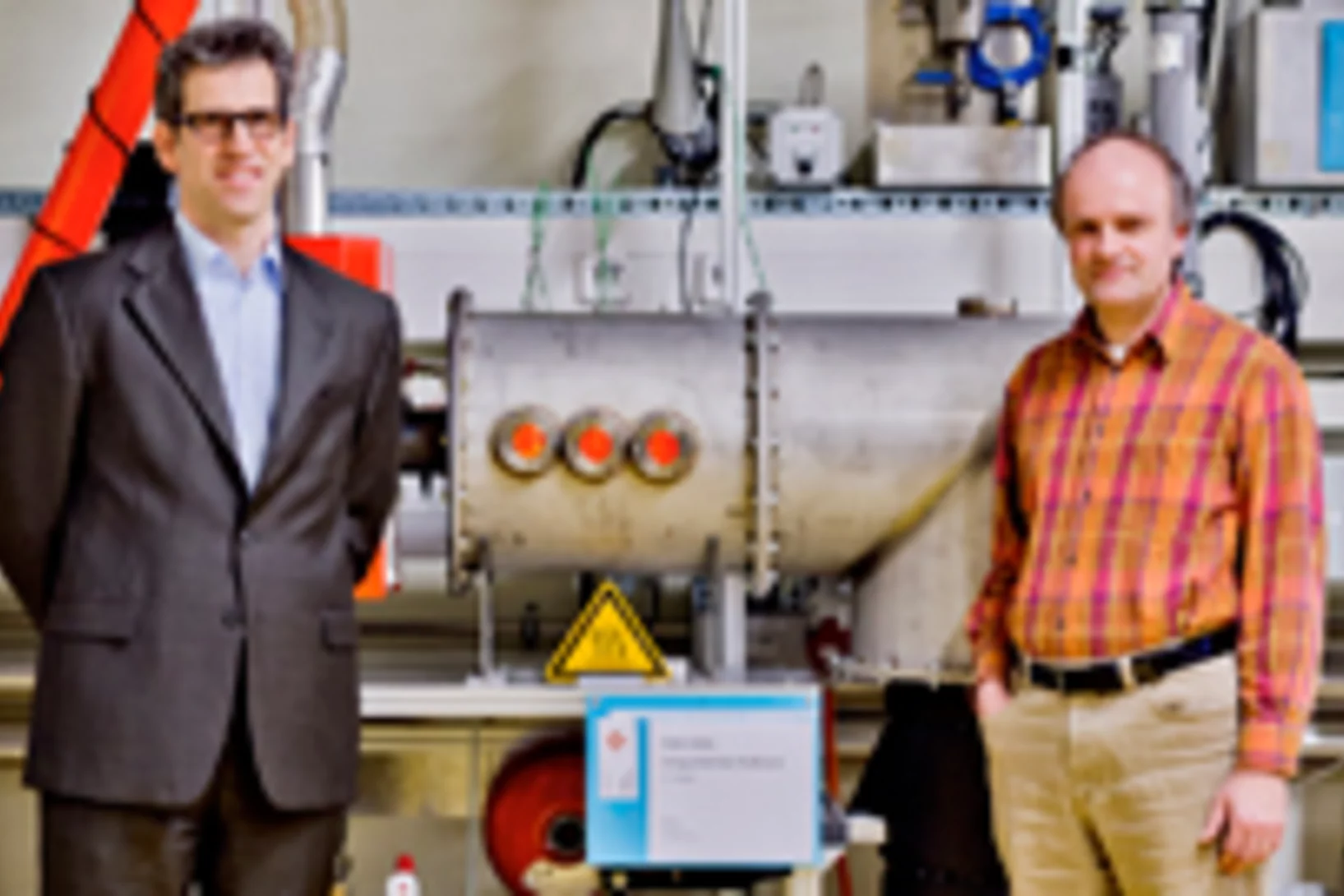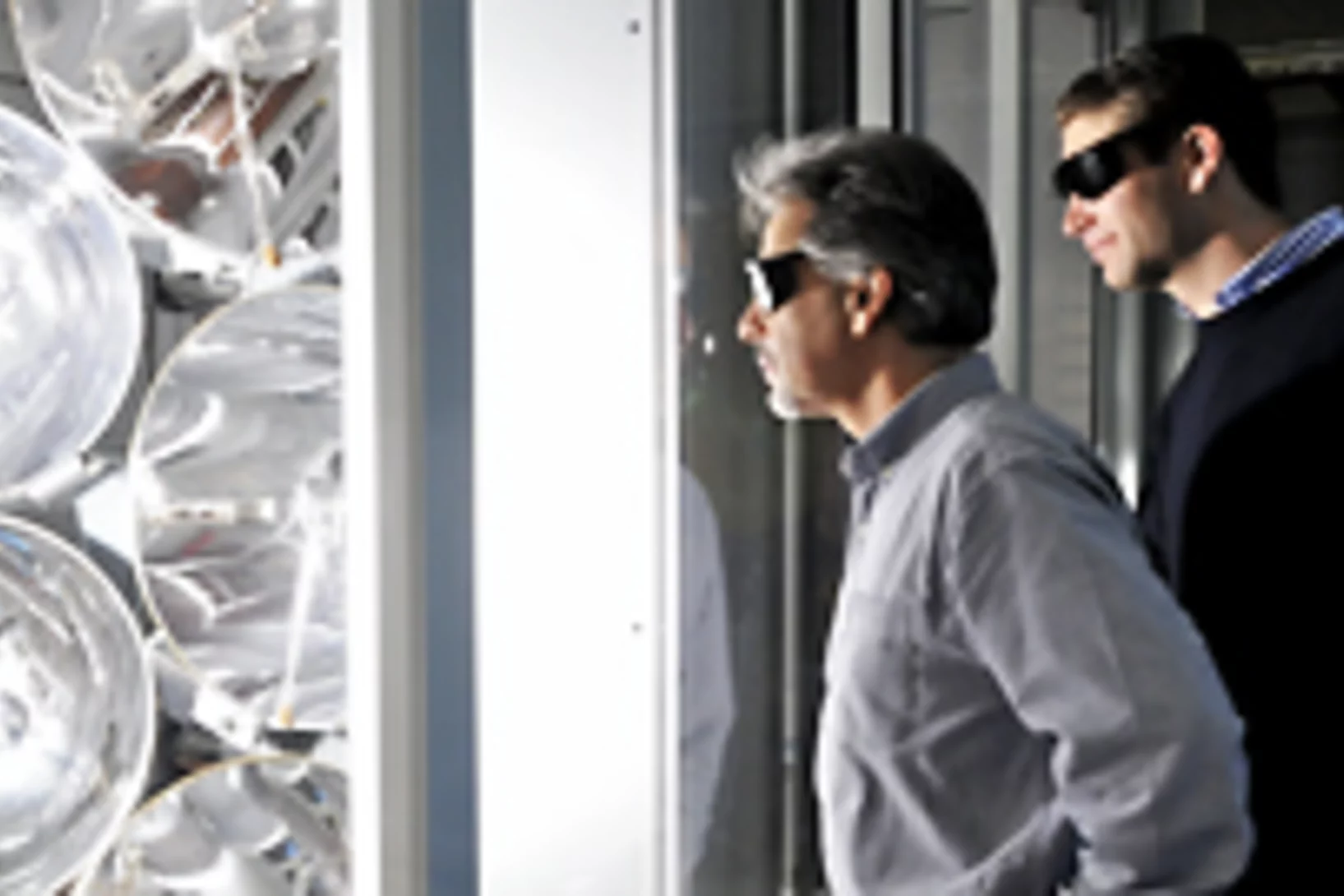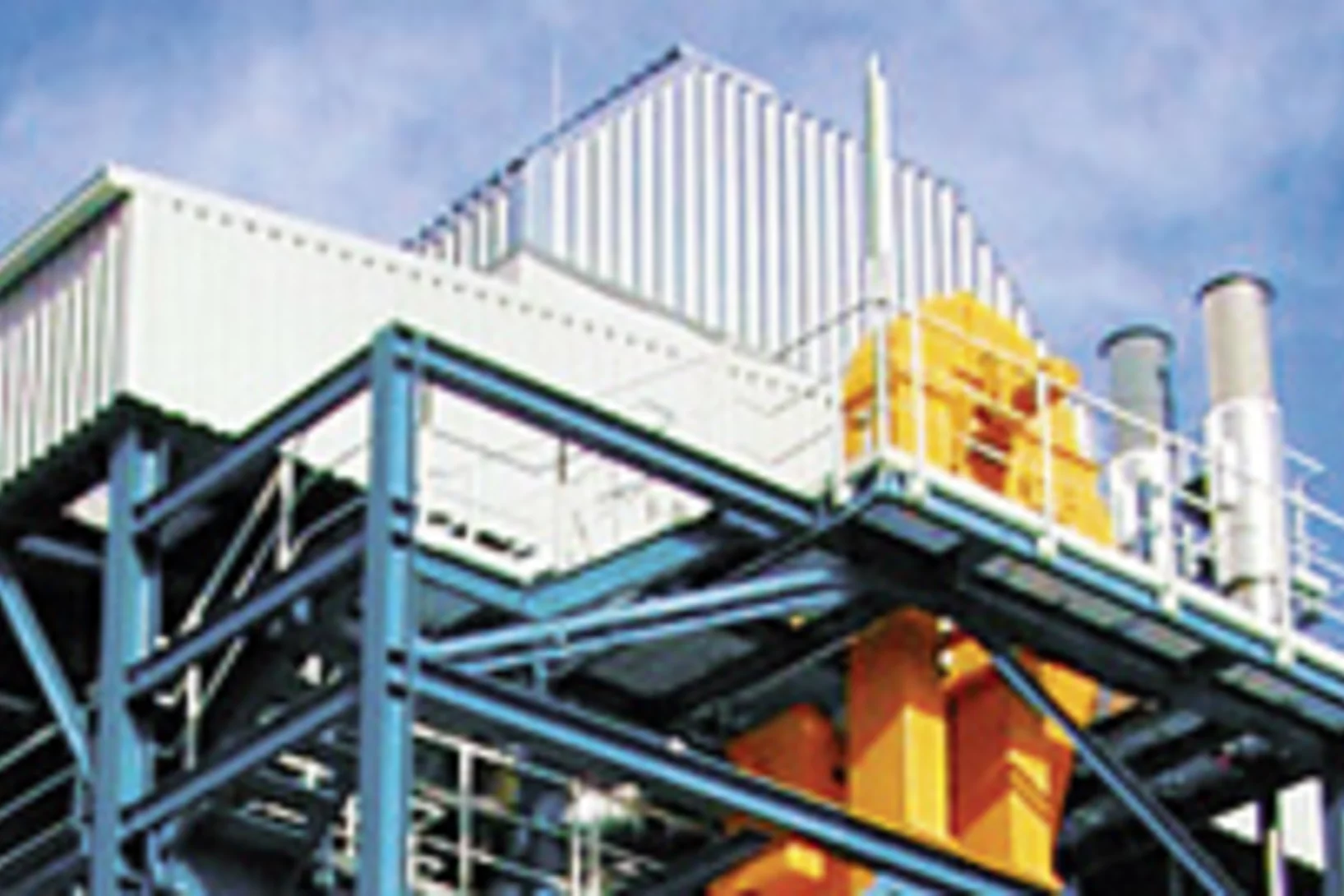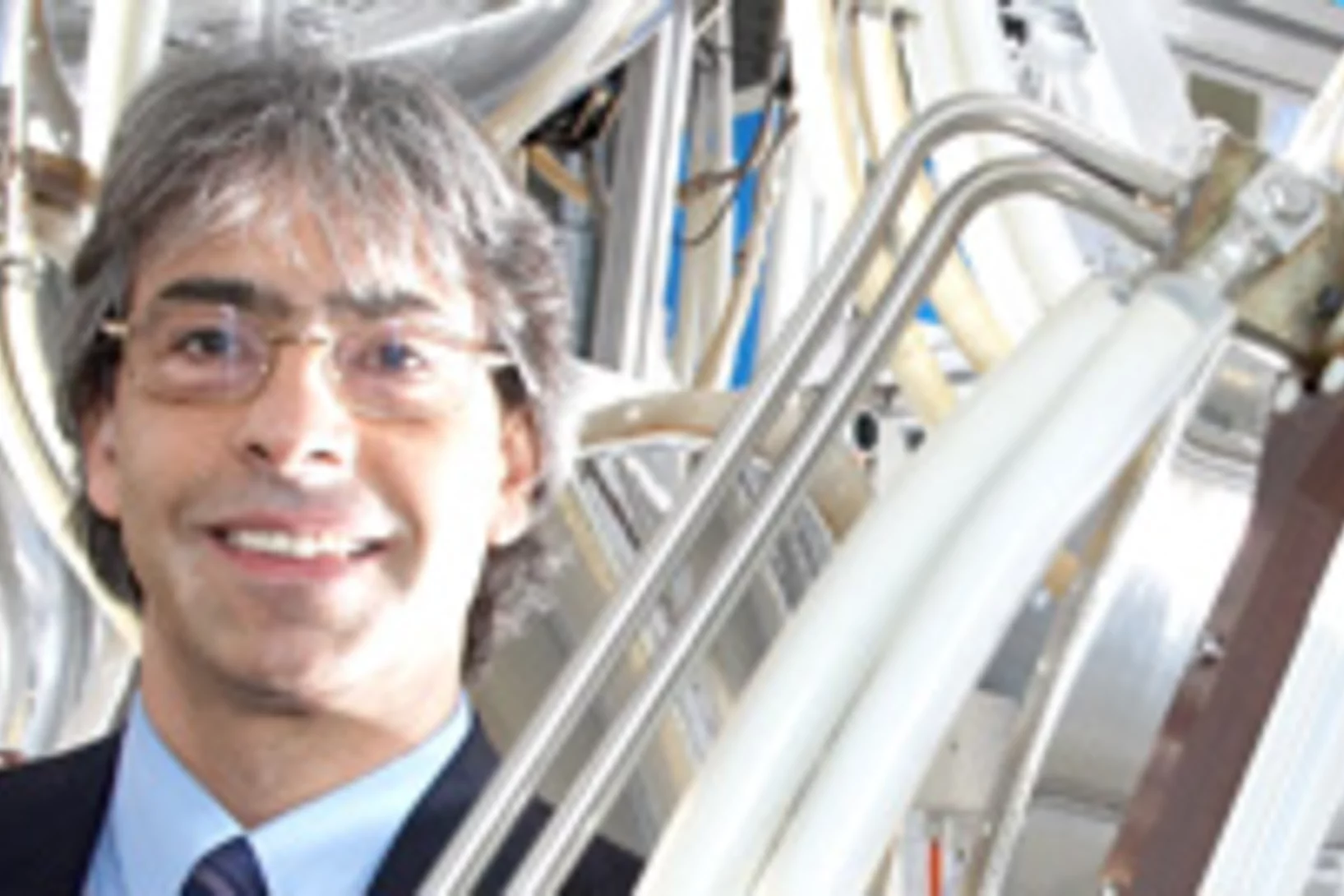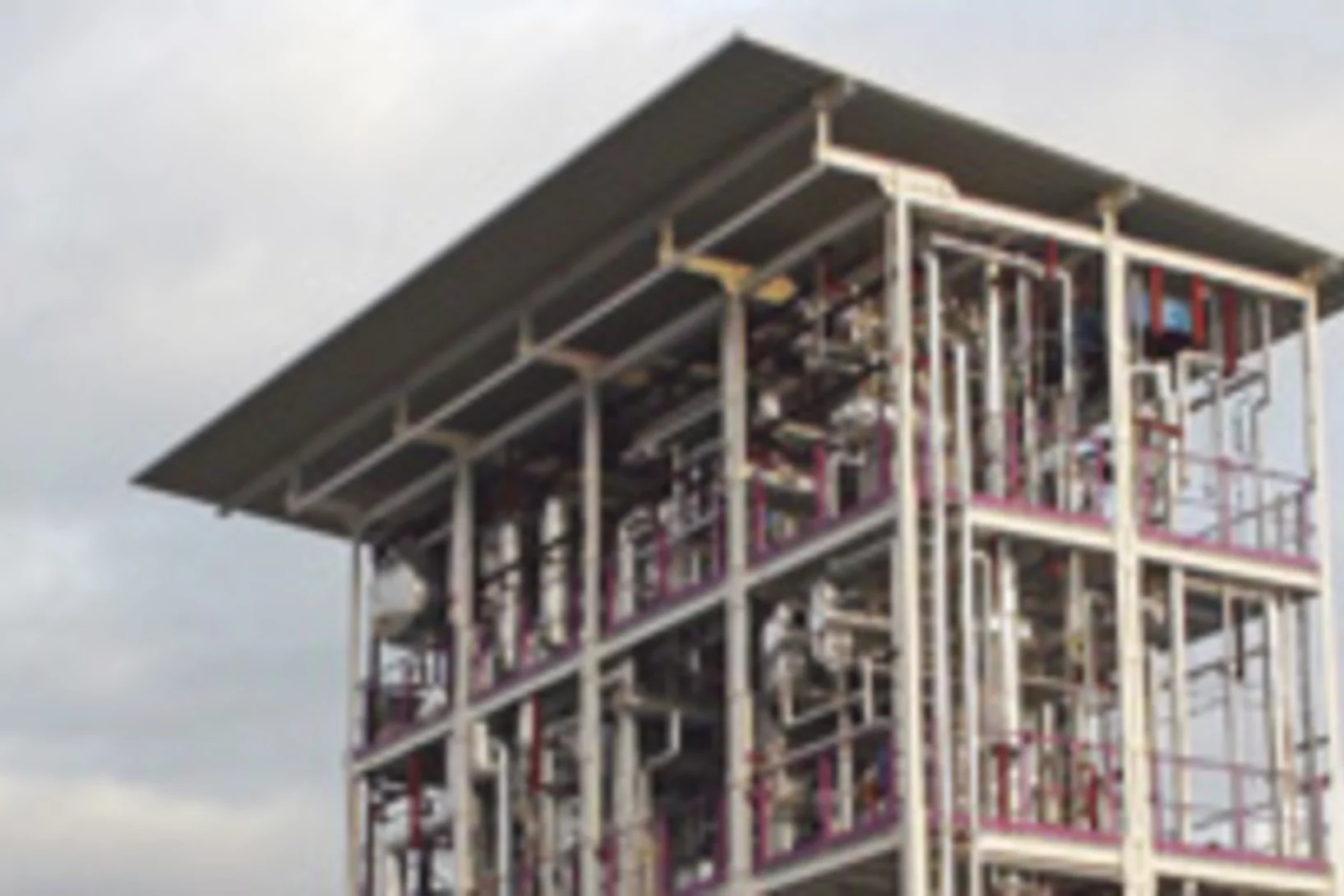Power on demand
If photovoltaic or wind power plants produce more electricity than the network can absorb, valuable energy is lost. At the ESI Platform, PSI researchers are investigating how fuel cells can contribute to making this energy usable in a targeted way through storage.
Profitable for both sides
The young company Swiss Hydrogen is located in Fribourg. Here work is under way on competitive high-performance fuel cells that could be used in environmentally friendly vehicles or deployed as stationary power generators. In the company's collaboration with PSI, as CEO Alexandre Closset explains in this interview, both sides profit.
New technology undergoes real-world testing
The Zurich-based power company Energie 360° provides natural gas, biogas, and wood pellets throughout Switzerland. Now, with the Paul Scherrer Institute PSI, it has successfully tested a new Power-to-Gas technology to be implemented in the area of biogas production. The joint project was awarded the Swiss energy prize Watt d'Or 2018. In this interview, division manager Peter Dietiker talks about the collaboration with PSI.
Using what's there
At the Paul Scherrer Institute PSI, researchers are looking for solutions that enable energy from the sun, the wind, or biomass to be efficiently integrated into the Swiss energy system.
Efficient energy from biowaste – Watt d'Or for PSI and Energie 360°
Efficiently producing energy from biowaste: A technology developed at PSI and tested in collaboration with the Zurich-based energy provider Energie 360° makes it possible. It extracts significantly more methane from biowaste than conventional methods. For this important contribution to a sustainable energy supply, PSI and Energie 360° have now been awarded the Watt d'Or 2018 in the Renewable Energy category by the Swiss Federal Office of Energy.
Stress test passed
With a technology developed at the Paul Scherrer Institute PSI, around 60 percent more biogas can be produced from bio-waste than with conventional methods. But can it stand the test in practice as well? A 1,000-hour test at the Werdhölzli biowaste digestion and wastewater treatment plant in Zurich was able to answer this question with a clear yes. It was carried out in cooperation with the Zurich-based energy provider Energie 360°. The analysis of the stress test is now available.
More than just spilling the beans
Because of their high nitrogen content, spent coffee grounds are a popular garden fertilizer. Recycled in this manner, they already contribute to an environmentally friendly waste management. But they have the potential to deliver much more: a new procedure developed at the PSI allows high quality methane to be formed from spent coffee grounds. PSI researchers involved in a pilot project carried out in cooperation with the Swiss food producer Nestlé were able to show that spent coffee grounds left over during the production of instant coffee can be efficiently re-used elsewhere.
Nanomaterial helps store solar energy: efficiently and inexpensively
Efficient electrolysers are needed in order to store sun and wind energy in the form of hydrogen. Thanks to a new material developed by researchers at the Paul Scherrer Institute PSI and Empa, these devices are likely to become less costly and more efficient in the future. Researchers were also able to demonstrate that this new material can be reliably produced in large quantities, showing its performance capability in an electrolysis cell—the main component of an electrolyser.
Welcome to Esiville
A new visitor’s station at PSI tells the story of a Swiss town that makes the change from a conventional energy supply to one with new renewable energy sources.
How Switzerland could supply its electric power in 2050
The Laboratory for Energy Systems Analysis at the Paul Scherrer Institute PSI is investigating how Switzerland’s electricity supply might look, up to the year 2050, under a variety of boundary conditions. On the basis of their calculations, the lab’s researchers are able to generate insights on possible future developments of the energy sector, for example, determine how an ambitious reduction in CO2 emissions could be achieved at the lowest possible cost.
Higher methane yield from bio-waste
Within Switzerland’s bio-waste a huge amount of precious energy is hidden. That’s because valuable methane, the main constituent of natural gas, can be obtained from it. With a technology developed at PSI, the yield of methane from bio-waste could be increased considerably in the future. A long-term test conducted in cooperation with Energie 360° at the Werdhölzli fermentation and wastewater treatment plant is expected to advance this technology further along its path to industrial use.
24 hours at the ESI Platform (video)
How can surplus power that can’t be fed into the electric grid be made usable? A fictitious day at the Energy System Integration Platform at the Paul Scherrer Institute PSI.
Renewable energy: Experimental platform ESI is starting up
This fall, the time has come: The Energy System Integration Platform at the Paul Scherrer Institute PSI goes into operation. Today, in the framework of the double conference Networked Energy Research Switzerland, it was presented to the media and around 150 representatives from politics, industry, and science.
Sun-Petrol
Despite its great potential, solar energy still faces one big problem: the sun doesn’t always shine and its energy is hard to store. Now, researchers at the Paul Scherrer Institute PSI and the ETH Zurich have unveiled a chemical process that uses the sun’s thermal energy to convert carbon dioxide and water directly into high-energy fuels: a procedure developed on the basis of a ground-breaking material combination of cerium oxide and rhodium.
Turning Electricity into Gas – and back into Electricity
As capacities for producing solar and wind energy increase, integrating these into the existing energy system is becoming more of a challenge. The ESI platform is testing methods for successful integration. The answer: storing surplus energy as gas.
Water pathways make fuel cells more efficient
Researchers from the Paul Scherrer Institute (PSI) have developed a coating technique in the laboratory conditions that could raise the efficiency of fuel cells. The PSI scientists have already applied to patent the technique, which is suitable for mass production.
Biomasse als Stütze der Energiewende
Mit 80 Teilnehmerinnen und Teilnehmern fand am 2. Dezember am Paul Scherrer Institut PSI die erste Jahreskonferenz des Kompetenzzentrums des Bundes für Bioenergie (SCCER BIOSWEET) statt. Das im Rahmen des Aktionsplans Energieforschung Schweiz gegründete Kompetenzzentrum definierte in der Tagung die Ziele, Strategien und Positionierung der Bioenergie-Forschung vor dem Hintergrund der neuen schweizerischen Energiepolitik.This news release is only available in German.
New Renewables on integration course
The Swiss government’s Energy Strategy 2050 includes a significant expansion of renewable energy such as solar and wind power. The integration of this electric energy, which is produced in a decentralised way and with temporal fluctuations, poses a major challenge for power grids. One possible solution involves using the electricity surplus that would otherwise overload the grid for the production of gases such as hydrogen or methane. The electric energy would thus be stored temporarily in form of chemical energy. These gaseous energy carriers can be converted back into electricity, heat or kinetic energy (in gas engines) at a later date as and when needed. Dubbed power to gas, the concept is the focus of the new Energy System Integration (ESI) Platform at PSI.
Joint venture in the bioenergy and resource efficiency sector: PSI and FHNW establish joint institute
The Institute of Biomass and Resource Efficiency was founded by the two institutions, PSI (Paul Scherrer Institute) and FHNW (University of Applied Sciences Northwestern Switzerland), at the start of 2013. The aim of this new institute is to tackle the issue of resource efficiency throughout Switzerland, concentrating simultaneously on energy and material for the first time, and to thus make a significant contribution to the Federal Government’s "Energy Strategy 2050". The focus is on the sustainable use of biomass.
«Facettenauge» liefert Strom
«swisselectric research award 2011»Kostengünstiger Strom aus Sonnenenergie: Der Maschinenbauingenieur Illias Hischier hat einen Sonnenstrahlempfänger entwickelt, der die aufgenommene Energie über eine Gasturbine für die hocheffiziente Stromerzeugung nutzt. Hischier hat den Empfänger als Doktorand an der ETH Zürich in Zusammenarbeit mit dem Labor für Solartechnik am Paul Scherrer Institut entwickelt. Er erhält dafür den «swisselectric research award 2011».This news release is only available in German.
Benzin aus Wasser, CO2 und Sonnenlicht
Einem Forschungsteam um Aldo Steinfeld ist es gelungen, mit Solarenergie aus Wasser und Kohlendioxid Treibstoff zu erzeugen. Dazu haben die Wissenschaftler einen Solar-Reaktor entwickelt, in dem konzentrierte Sonnenstrahlung das dafür nötige thermochemische Verfahren antreibt.This news release is only available in German.
Producing Synthetic Natural Gas from Wood
PSI researchers are investigating methods for converting wood waste into synthetic natural gas that could be fed into the public gas grid. Switzerland has enough wood available to cover several percent of its total energy requirements. Energy production from wood is CO2-neutral, due to the fact the CO2 formed during combustion would otherwise be released when the wood rotted down. Unlike the direct combustion of wood, however, use of this synthetic gas produces no harmful particulate matter.
Treibstoff aus Sonnenenergie
Solar researcher Aldo Steinfeld, Laboratory Head at PSI and Professor at ETH Zurich, wins the Yellot Award awarded by the American Society of Mechanical Engineers (ASME) for his research on renewable energy.This news release is only available in German.
In Zukunft kommt das Brennholz aus der Gasleitung
Forschende des Paul Scherrer Instituts (PSI) haben mit Kollegen der TU Wien ein Verfahren entwickelt, mit dem man Erdgas aus Holz erzeugen kann. An einer Testanlage wurde das Verfahren im technischen Massstab erfolgreich erprobt. Für Ihre Arbeit erhalten die PSI-Forschenden am 8. Januar die Auszeichnung Watt d'Or.This news release is only available in French and German.

